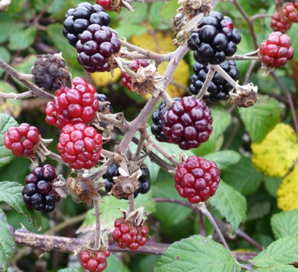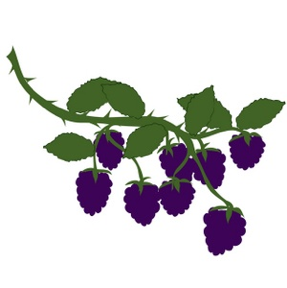September greeting from this edition of Herbs, Healing and Health.
Blackberry Bliss.
Tis the season to go foraging! We are moving into the lush time of year, when plenty of rather fine fruits and other healing plants are available for our eager consumption in plentiful supply. I particularly love  blackberries for their resilience in this matter. They stubbornly refuse to be overlooked by modern day man (and woman) and must surely win some sort of award for the most picked wild fruit in the country. It is good to know that at least once a year a fairly substantial proportion of us are still ‘ingesting the wild’ in this form.
blackberries for their resilience in this matter. They stubbornly refuse to be overlooked by modern day man (and woman) and must surely win some sort of award for the most picked wild fruit in the country. It is good to know that at least once a year a fairly substantial proportion of us are still ‘ingesting the wild’ in this form.
Traditionally blackberries have been used medicinally for a wide variety of complaints. The astringent properties of the bark of the root and of the leaves are due to the presence of tannins. This has made these parts of the plant useful for haemorrhoids, diarrhoea, and even dysentery in former times.
The lovely berries contain a great cross section of antioxidants making them very beneficial for a wide range of illnesses up to and including diabetes and certain types of cancer. [1]
For a lovely all purpose syrup to use over ice cream, on pancakes over your porridge in cocktails etc, use the following basic recipe.
Blackberry syrup
Place blackberries in a saucepan with a small amount of water (around a tablespoon per punnet). Add a cinnamon stick if desired. Heat gently then mash to release juice. Pour juice and pulp out into a sieve held over a jug and extract as much juice as possible. Place juice in clean saucepan. For every 600ml juice extracted, add 300g sugar. Bring to boil, then reduce until desired consistency. Allow to cool, then pour into sterillized bottles and label clearly.
If you are using your syrup for medicinal properties, using equal quantities of blackberries and elderberries will definitely impart benefits for the treatment of coughs and colds. Use warming spices such as clove, cinnamon, ginger and star anise for extra medicinal wow! Take a good tablespoon in hot water regularly with head colds etc.
Blackberry leaf tea.
Pick young, fresh blackberry leaves in spring and summer. Use fresh or gently dry indoors until leaves crumble easily in your hand. [2]
Drink freely, using a few fresh leaves or a teaspoon of dried leaves. If you are unfortunate enough to be using them for diarrhoea, make the tea double strength and drink a mugful at least once an hour. Raspberry leaves would be great to add to this tea as they also have good anti-diarrhoeal properties. Grain mhuine is a gaelic name for blackberry and translates as ‘thorn that basks in the sun’[3]. Its rather lovely to think that we are using the energy of the summer sun to treat our winter ailments and chills.
Blackberries are one of the many examples that we can use to demonstrate the false division that we have in our minds between food and medicine.
Why do we eat?
Well, of course there are lots of valid answers to that question, but one obvious one is to give our bodies what they need to stay healthy and to carry out vital healing and repair work (a lot of which goes on whilst we sleep).
Carrying on the food as medicine theme, I will grab this opportunity to mention a workshop that I am giving at our wonderful, local Red Brick Café in Bridport, in their charming new courtyard garden, at the beginning of October. In this workshop we will look at various plants used for culinary purposes and what their medicinal benefits are. The beautiful ladies at the Red Brick Café know a thing or two about good food, so this is an idea place to hold this workshop!
See below under upcoming events for more details.
As ever with these workshops I do try to keep the prices as low as possible.
If you are intending to come, I would very much appreciate it if you could book in advance as this gives me an idea of costs, how many to expect etc, and just makes life easier for me.
I hope to see some of you there.
In the meantime, eat the wild.
Much love
Mary
Bibliography/Reference
- Verma, R., et al., Rubus fruticosus (blackberry) use as an herbal medicine. Pharmacognosy Review, 2014. 8(16): p. 101 – 104.
- Bruton-Seal, J. and M. Seal, Hedgerow MedicineHarvest and Make Your Own Herbal Remedies 2009, Shropshire, UK: Merlin Unwin Books Ltd.
- Darwin, T., The Scots Herbal. The Plant Lore of Scotland. 2008, Edinburgh: Birlinn Ltd.
